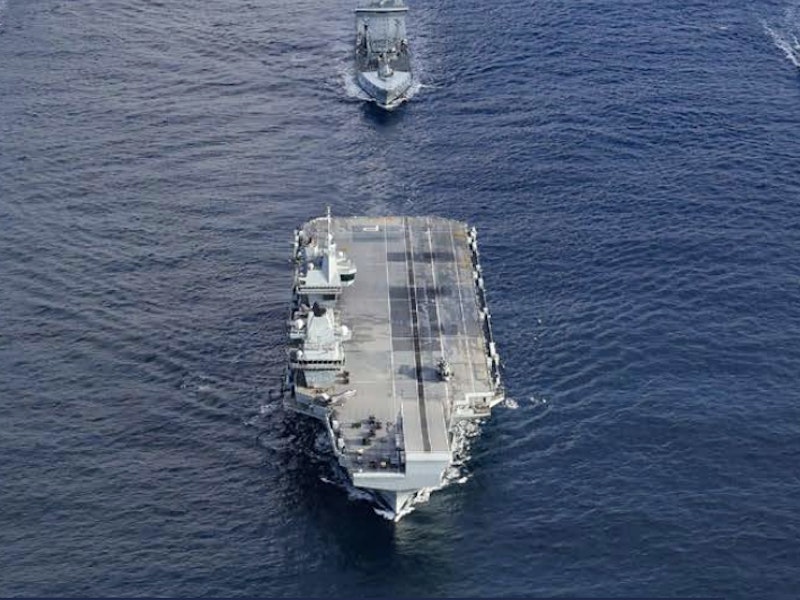
Leading analysts address challenges of geopolitically dynamic environments at Adarga panel discussion
Adarga’s latest panel discussion saw subject-matter experts from across the defence, geoeconomic, and geopolitical intelligence domains join the Adarga Research Institute's Sam Olsen to explore the strategic importance of the South China Sea for businesses and militaries alike, and the challenges it presents to analysts tasked with covering the region.
The event placed an emphasis on the South China Sea’s vulnerability as a strategic chokepoint, and how the tradecraft and technology that analysts use to stay on top of what is a highly unpredictable and volatile region can be applied elsewhere.
Speaking on the panel were Dr. Francesca Ghiretti, Adjunct Fellow at the Center for Strategic and International Studies; F. Xavier Casals, Lead Analyst for Asia-Pacific at Janes; and Lukas Fiala, Head of China Foresight at the London School of Economics’ foreign policy think tank, LSE IDEAS.
The panel addressed a broad range of topics and questions from an engaged and informed audience of security, risk, and intelligence leaders that spanned the commercial intelligence sector, financial services industry, military, national security, and government departments, among others. Key takeaways from the discussion included:
Events in the South China Sea are a global concern for businesses and militaries
One third of all global shipping and around 30% of crude oil transits the South China Sea. Combined with the fact that nine out of the 10 busiest seaports in the world are located there means that what happens in the region has far reaching consequences that can severely impact a company’s bottom line and everything from commodity prices, to the availability of goods, and everyday living costs for much of the world.
As a geostrategically important region, the South China Sea is increasingly influential in setting foreign policy for many countries, with significant resources – military and otherwise – being dedicated to the region by countries seeking to exert influence and support allies there.
For China, the region is central to its security and resilience
While there is much international focus on the relationship between China and Taiwan, the South China Sea has numerous actors with capable militaries and is seen by the Chinese government as a crucial region for economic and national security. For example, two thirds of Chinese trade passes through the maritime area, along with 70% of its liquid natural gas and petroleum imports.
China has dedicated significant military and other resources to the region, with the People’s Liberation Army Navy positioning an aircraft carrier and 4 of its most advanced destroyers in the South China Sea, for example. The region’s economic importance extends beyond its strategic shipping and trade routes - the rich resources found there include rare earth minerals, and China has invested heavily in the development of largescale offshore wind farms. China uses its influence over the mining and processing of rare earth minerals as a powerful means of influence globally, which could be weakened if other actors tap into the reserves found under the South China Sea.
China wants to be able to project power into this maritime geography and to be able to deny access to any potential adversary …. [the South China Sea] is one of the key strategic priorities in Chinese foreign and security policy.
Lukas Fiala, Head of China Foresight, LSE IDEAS
Effective tradecraft and emerging technologies can help analysts and decision-makers overcome the challenges that the South China Sea poses
The number of actors in the region, multiple languages to consider, and the sheer volume and diversity of information and data available on the South China Sea presents a myriad of challenges to analysts, for which an astute combination of skills and technology must be applied. This is vital to ensuring they can deliver the best possible foresight to decision-makers in order for them to mitigate risk and react quickly to events or developments.
Assured sources and data are crucial for analysts, as is the ability to draw on subject-matter expertise – including from local analysts or those with first-hand experience of the region.
However, the need to process large volumes of information from multiple language sources and formats is increasingly necessitating the use of Artificial Intelligence as a tool to augment analysts. The application of AI models to lift the research burden and automated translation tools were noted as key capabilities, the latter being essential to understanding different perspectives - which can only be achieved by unlocking local sources. Combined with the analytical expertise of human analysts these technologies are a significant force multiplier and can shorten the observe, orient, decide, act (OODA) loop.
We don’t have the capacity to do what can be done with machine learning …. there is a role for AI to help us as analysts in shortening the OODA loop.
F. Xavier Casals, Lead Analyst for Asia-Pacific, Janes
Disinformation is a growing issue for analysts covering the region, but is not insurmountable
As with elsewhere in the world, analysts covering the South China Sea must be cognizant of the risks of disinformation by the different countries in the region. It is here that analysts’ expertise and skills, trusted sources, and access to proprietary datasets with verified information are crucial. Technology can also play an important role, such as the use of knowledge graphs to map sources of information and help understand if a coordinated effort is being made to control the narrative.
Taking a breath and not rushing in, consulting multiple sources, and tapping into your own expertise and that of your network are means to countering disinformation.
Dr. Francesca Ghiretti, Adjunct Fellow, Center for Strategic and International Studies
To download a recording of the event click here
This was the latest in a new line-up of events and we'd love to host you in the future, so please sign up here to keep informed on our upcoming events.









